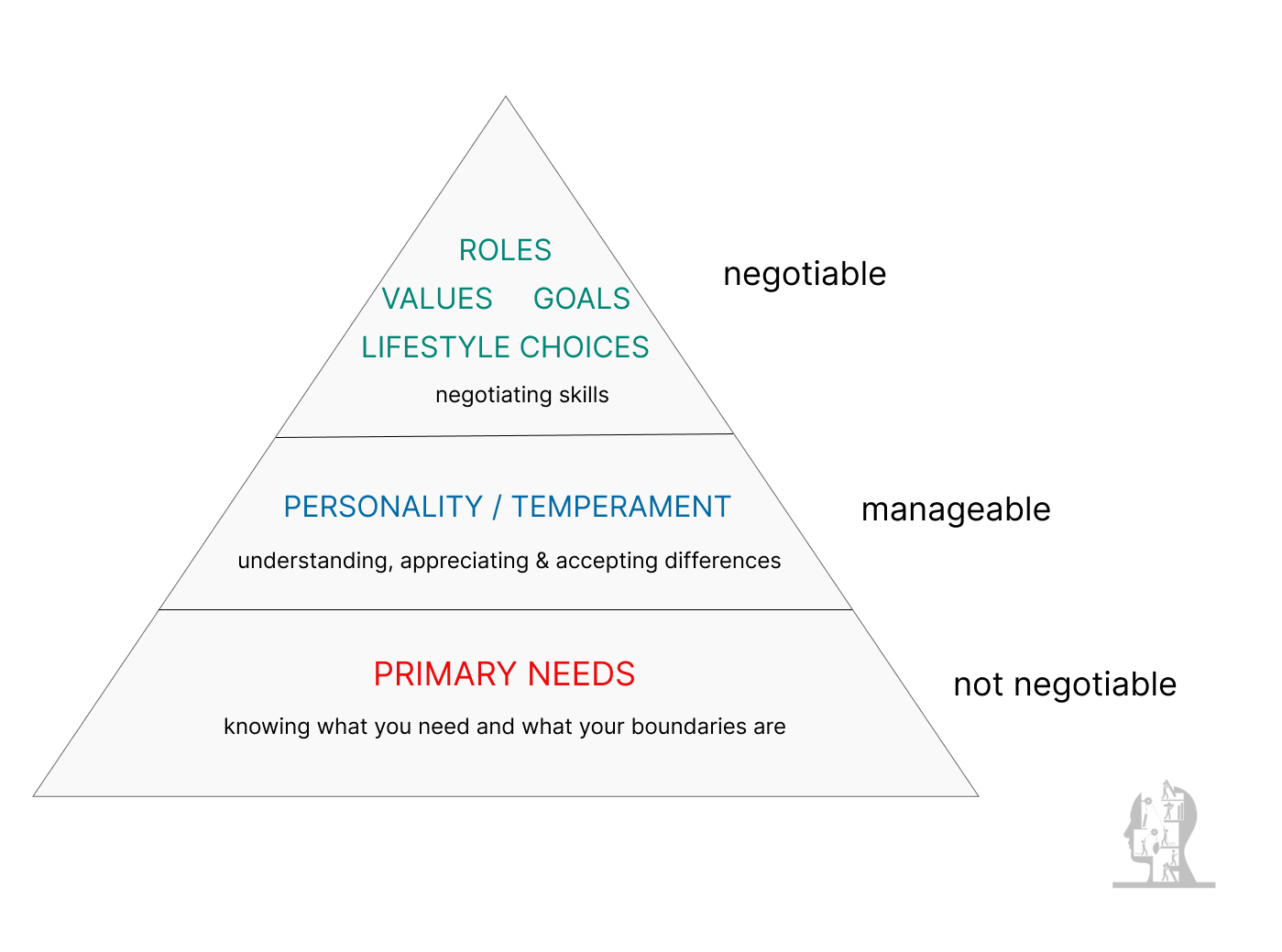What Most Couples Don't Understand About Relationships: A Reality Check
Learn why some relationship conflicts can be solved through negotiation while others signal deeper incompatibility. This relationship pyramid model reveals what's truly negotiable in love.
This is how most couples therapy sessions begin: two people who are frustrated, confused and exhausted from endless unresolved conflicts, both convinced their partner simply isn't listening or capable of understanding them. Often, one person is secretly hoping the therapist be the voice of reason who finally brings some sense to their supposedly unreasonable partner.
Welcome to what I call the Great Relationship Negotiation Confusion—the mistaken belief that everything in a partnership is up for discussion, compromise, and eventual resolution. Spoiler alert: it's not, and understanding why might just save your relationship.
Before I elaborate further, here's a visual representation of the framework I utilize to assess couples' functionality and identify areas of dysfunction:
The Foundation: Primary Needs
Let's start at the bottom of our relationship pyramid with primary needs—the stuff that's about as negotiable as gravity. These are your core requirements for feeling human, secure, and whole. Think of them as your relationship operating system: mess with them, and the whole thing crashes.
Your primary needs might include feeling emotionally safe, having your thoughts and feelings respected, maintaining your sense of individual identity, or requiring physical affection to feel connected. These aren't preferences or nice-to-haves— they're the fundamental requirements for your psychological well-being.
Here's where couples get into trouble: they mistake love for willingness to negotiate away their primary needs. I've watched people try to convince themselves they don't really need emotional intimacy, or that they can learn to live without respect, or that their boundaries are just "being difficult." It's like trying to hold your breath indefinitely—you might manage for a while, but eventually, you're going to gasp for air.
The harsh truth? If your primary needs are fundamentally incompatible with your partner's, no amount of couples therapy, communication workshops, or good intentions will fix it. It's not about being stubborn or unloving, it's about basic psychological compatibility. You can't love someone into needing less oxygen.
Boundaries are particularly crucial in this foundation layer. Your boundaries aren't walls you build to keep love out – they're the property lines that define where you end and your partner begins. Maybe you need alone time to recharge, or you can't tolerate being yelled at, or you require honesty even when it's uncomfortable. These boundaries aren't suggestions for your partner to consider; they're requirements for your well-being.
The tricky part? Many people struggle with expressing their boundaries clearly because they've been taught that having needs makes them "high maintenance" or "difficult." But here's the reality check: unclear or unspoken boundaries lead to resentment, while clear boundaries lead to respect. When you say "I need to feel heard when I'm upset" or "I can't be in a relationship where my feelings are dismissed," you're not being demanding – you're being clear about what you need to show up as your best self.
Unclear boundaries lead to resentment, while clear boundaries lead to respect.
But here's the empowering part: when you know your primary needs and can communicate them clearly (without apology), you're actually doing your relationship a huge favor. You're providing a roadmap for how to love you successfully, and you're showing up as a whole person rather than a half-person hoping your partner will complete you.
The Middle Ground: Personality and Temperament
Moving up our pyramid, we hit the manageable zone: personality and temperament differences. This is where the magic of "understanding, appreciating, and accepting differences" comes into play. Your partner isn't broken because they're an introvert; they're just wired differently than your extroverted self.
I like to think of personality differences as speaking different emotional languages. One person might process stress by talking it out immediately, while the other needs to retreat and think first. One might show love through acts of service, while the other needs words of affirmation. These differences aren't problems to solve – they're operating systems to understand and work with.
The key word here is "manageable." You can't negotiate an anxious person into being naturally calm, but you can negotiate how to empathetic and support each other when anxiety strikes. You can't change someone's fundamental temperament, but you can create agreements about how to honor both people's natural tendencies.
Here's where it gets really interesting: we're often attracted to partners who embody qualities that represent our "shadow self" – the parts of us we haven't fully developed or have suppressed. The highly organized person falls for the free spirit. The cautious planner is drawn to the spontaneous adventurer. The people-pleaser is attracted to someone who has no trouble saying no. Initially, these differences feel exciting and complementary – your partner seems to complete you in ways you never expected.
But it gets complicated: the very qualities that attracted you can become the source of your biggest frustrations. That free spirit you found so refreshing? Now their lack of planning drives you crazy. That spontaneous adventurer who swept you off your feet? Now you're stressed about their inability to stick to a budget. This isn't a sign that you chose wrong—it's a sign that you're both human beings with complementary strengths and blind spots.
Empathy is the ability to see things from another person's perspective without judgment or sympathy, without agreeing or being opinionated.
The couples who thrive in this middle layer are the ones who get curious instead of frustrated. It’s called empathy, they ability to see things from another person's perspective without judgment or sympathy, without agreeing or being opinionated. Instead of "Why can't you just be more like me?" they ask "What's it like being you, and how can we make this work for both of us?" It's the difference between trying to change your partner and learning to dance with who they actually are.
The Top Layer: The Negotiation Zone
Welcome to the top of the pyramid, where your negotiation skills actually matter! This is where we find roles, values, goals, and lifestyle choices – the stuff that couples therapy was invented for. Who does the dishes? How do we handle money? Where do we spend holidays? Do we want kids? These are the meaty topics that require actual negotiation skills.
Here's the beautiful thing about this layer: it's all about external circumstances and behavioral agreements, not fundamental aspects of who you are. You can negotiate chore distribution without negotiating away your identity. You can compromise on vacation destinations without compromising your core values.
But even in the negotiation zone, success depends on both people bringing their whole selves to the table. The best negotiations happen when both partners are empathetic, clear about their primary needs (the non-negotiable foundation) and understand each other's personalities (the manageable middle), so they can find creative solutions that honor both people while making sure their boundaries are respected.
Why This Framework Changes Everything
Here's what I've learned after years of watching couples struggle: most relationship conflicts aren't actually about the thing you're fighting about. They're about which layer of the pyramid you're operating from, and whether you're trying to negotiate something that isn't actually negotiable.
When couples understand this framework, they stop wasting energy trying to change each other's fundamental wiring and start focusing on the areas where their efforts can actually make a difference. They stop having the same circular argument about introversion versus extroversion and start negotiating how to balance social time with quiet time.
The pyramid also helps couples recognize when they're dealing with genuine incompatibility versus manageable differences. Sometimes the kindest thing is to acknowledge that your primary needs are fundamentally incompatible, rather than spending years trying to negotiate each other into different people.
The Bottom Line
Not everything in your relationship is up for negotiation, and that's actually good news. It means you can stop trying to change the unchangeable and start working together on the things that actually matter. Your partner's personality isn't a problem to solve, it's a reality to work with. Your primary needs aren't demands to be ashamed of—they're the foundation of your authentic self.
The strongest relationships aren't built on the fantasy of mutual transformation. They're built on the reality of two whole people who understand themselves well enough to show up authentically and care enough about each other to make the negotiable stuff work.
So next time you're in a relationship conflict, ask yourself: "What layer of the pyramid am I operating from?" The answer might just change everything.




I’m curious why you think values are negotiable? Those would be near foundational I would think.
Love this - really rings true! Thanks for publishing @Rob Lefort